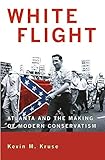White Flight : Atlanta and the Making of Modern Conservatism / Kevin M. Kruse.
Material type: TextSeries: Politics and Society in Modern America ; 89Publisher: Princeton, NJ : Princeton University Press, [2013]Copyright date: ©2005Description: 1 online resource (352 p.) : 12 halftones. 12 mapsContent type:
TextSeries: Politics and Society in Modern America ; 89Publisher: Princeton, NJ : Princeton University Press, [2013]Copyright date: ©2005Description: 1 online resource (352 p.) : 12 halftones. 12 mapsContent type: - 9780691092607
- 9781400848973
- HISTORY / United States / 20th Century
- Brown v Board of Education
- Civil Rights Act
- KKK
- Ku Klux Klan
- Lester Maddox
- Martin Luther King Jr
- NAACP
- Republican
- Republicans
- Second Battle of Atlanta
- cause of white flight
- civil rights movement
- desegregation
- freedom of association
- history of white flight
- ideology
- impact of white flight
- legacy of white flight
- origins of conservatism
- racism
- racist
- roots of conservatism
- school desegregation
- seg schools
- segregation academies
- segregation
- segregationist
- sit ins
- southern strategy
- strategy
- systemic racism
- white supremacy
- 305.8009758231
- online - DeGruyter
- Issued also in print.
| Item type | Current library | Call number | URL | Status | Notes | Barcode | |
|---|---|---|---|---|---|---|---|
 eBook
eBook
|
Biblioteca "Angelicum" Pont. Univ. S.Tommaso d'Aquino Nuvola online | online - DeGruyter (Browse shelf(Opens below)) | Online access | Not for loan (Accesso limitato) | Accesso per gli utenti autorizzati / Access for authorized users | (dgr)9781400848973 |
Browsing Biblioteca "Angelicum" Pont. Univ. S.Tommaso d'Aquino shelves, Shelving location: Nuvola online Close shelf browser (Hides shelf browser)

|

|

|

|

|

|

|
||
| online - DeGruyter Hamas and Civil Society in Gaza : Engaging the Islamist Social Sector / | online - DeGruyter Ancient Chinese Thought, Modern Chinese Power / | online - DeGruyter Indeterminacy and Society / | online - DeGruyter White Flight : Atlanta and the Making of Modern Conservatism / | online - DeGruyter Reflections on the Musical Mind : An Evolutionary Perspective / | online - DeGruyter Niccolò Machiavelli : An Intellectual Biography / | online - DeGruyter The Hanged Man : A Story of Miracle, Memory, and Colonialism in the Middle Ages / |
Frontmatter -- Contents -- List of Illustrations -- Acknowledgments -- Introduction -- Chapter One. "The City Too Busy to Hate": Atlanta and the Politics of Progress -- Chapter Two. From Radicalism to "Respectability": Race, Residence, and Segregationist Strategy -- Chapter Three. From Community to Individuality: Race, Residence, and Segregationist Ideology -- Chapter Four. The Abandonment of Public Space: Desegregation,Privatization,and the Tax Revolt -- Chapter Five. The "Second Battle of Atlanta": Massive Resistance and the Divided Middle Class -- Chapter Six. The Fight for "Freedom of Association": School Desegregation and White Withdrawal -- Chapter Seven. Collapse of the Coalition: Sit-Ins and the Business Rebellion -- Chapter Eight. "The Law of the Land": Federal Intervention and the Civil Rights Act -- Chapter Nine. City Limits: Urban Separatism and Suburban Secession -- Epilogue: The Legacies of White Flight -- Abbreviations -- Notes -- Index
restricted access online access with authorization star
http://purl.org/coar/access_right/c_16ec
During the civil rights era, Atlanta thought of itself as "The City Too Busy to Hate," a rare place in the South where the races lived and thrived together. Over the course of the 1960s and 1970s, however, so many whites fled the city for the suburbs that Atlanta earned a new nickname: "The City Too Busy Moving to Hate." In this reappraisal of racial politics in modern America, Kevin Kruse explains the causes and consequences of "white flight" in Atlanta and elsewhere. Seeking to understand segregationists on their own terms, White Flight moves past simple stereotypes to explore the meaning of white resistance. In the end, Kruse finds that segregationist resistance, which failed to stop the civil rights movement, nevertheless managed to preserve the world of segregation and even perfect it in subtler and stronger forms. Challenging the conventional wisdom that white flight meant nothing more than a literal movement of whites to the suburbs, this book argues that it represented a more important transformation in the political ideology of those involved. In a provocative revision of postwar American history, Kruse demonstrates that traditional elements of modern conservatism, such as hostility to the federal government and faith in free enterprise, underwent important transformations during the postwar struggle over segregation. Likewise, white resistance gave birth to several new conservative causes, like the tax revolt, tuition vouchers, and privatization of public services. Tracing the journey of southern conservatives from white supremacy to white suburbia, Kruse locates the origins of modern American politics.Some images inside the book are unavailable due to digital copyright restrictions.
Issued also in print.
Mode of access: Internet via World Wide Web.
In English.
Description based on online resource; title from PDF title page (publisher's Web site, viewed 29. Jul 2021)


